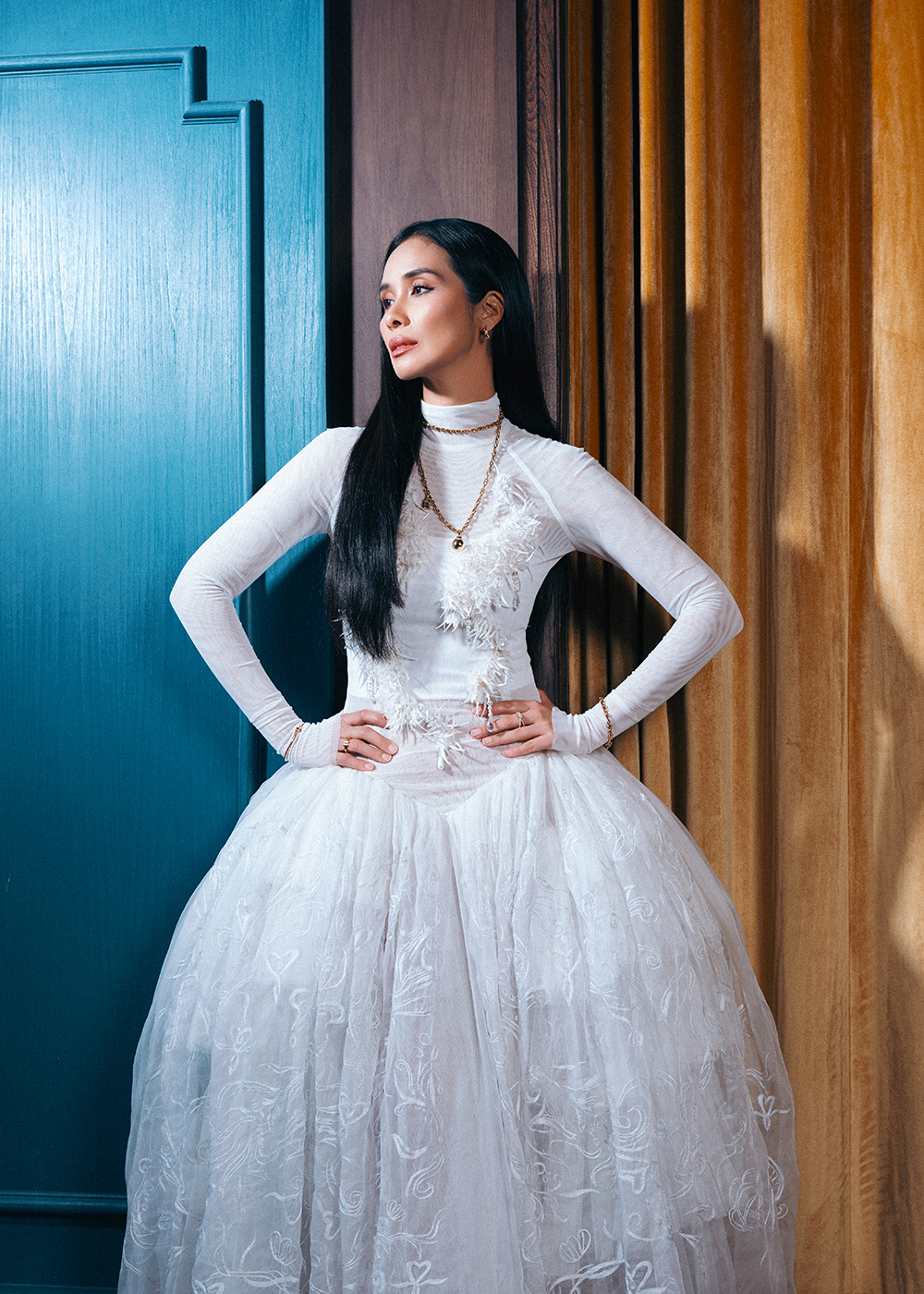Few Indonesian actresses have built a career as quietly exacting and resonant as Marsha Timothy. Born and raised in Jakarta, she entered the film industry almost by chance, yet for more than two decades, she has made a practice of inhabiting other lives with uncommon empathy and restraint.
Whether as the stoic Marlina in Marlina the Murderer in Four Acts or the grief-stricken Dita in her latest project, Tukar Takdir, Marsha embodies women who speak less but feel deeply – characters who demand not performance, but presence.
When we meet her virtually during our cover shoot at the 25hours Hotel Jakarta, she is thoughtful, poised, and radiates the calm assurance of someone who knows who she is and what she wants from her craft. “I’ve always thought that it’s a privilege for an actor to live in someone else’s shoes, to experience what they experience,” she says with a composed smile, as the glam team preps her hair and makeup for our Showbiz Issue. “For me, acting has always been a spiritual journey.”
It’s an apt description for a woman whose artistry lies not in reinvention for its own sake, but in the constant evolution of self – the act of becoming.
Becoming the Character
Marsha Timothy’s journey in the entertainment industry started far from the red carpets she’s familiar with today. After completing her degree in Economics and Management, she was scouted for a commercial and later cast in the director’s film debut, Expedisi Madewa. “It never crossed my mind to become an actress,” she admits. “I had just finished university and didn’t know what to do next. So, when the casting came, I thought, ‘why not?’”
Her love for acting was not instantaneous but rather a slow burn: by her second or third film, she felt the work had chosen her. Since then, Marsha has developed a disciplined method of preparation: rehearsals, readings, conversations with directors and writers, and a personal ritual – music. “I find songs that suit their journey,” she says of the way she approaches characters. Music, she explains, sets the emotional tempo and helps translate interior life into physical truth.

“Acting has helped me build more empathy, and I always find things to learn from my characters.”
Her latest collaboration with director Mouly Surya, Tukar Takdir, is an example of her commitment to the process. The film – which premiered in Indonesian cinemas on 2 October and opened in Malaysia from 16 October – reunites Marsha with the filmmaker behind Marlina, and places her inside a story of fate, grief, and moral complexity.
In the film, she plays Dita, a woman who loses her husband in a plane crash after he swapped seats with the sole surviving passenger, Rawa (played by Nicholas Saputra). The role demanded that she balance visible trauma with restrained interiority. “At first, I was hesitant,” Marsha confesses. “I hate taking long flights, and this film is about a plane crash. But when I read the script, I fell in love with the story – and with her.”
Even though the emotions often run deep on camera, Marsha draws a firm line between performance and life. “When the director says ‘cut,’ I finish. I never bring any emotions home,” she says – a practical technique that allows her to dive fully into vulnerability, then return to the world intact. What she does bring home, however, are the lessons from each character – and the one takeaway she embraces from her latest movie is that you cannot tukar takdir (change fate).

Becoming a symbol of empowerment
That same belief in destiny guides her choice of characters, which often carry feminist undertones. When asked if she gravitates towards such roles, she says simply: “No, I think a good script is a good script; a good story is a good story. It’s nice to have the chance to play women who are empowering, you know, but it doesn’t need to be someone great. Even a housewife or someone with a regular job can be inspiring.”
“I’m open to any kind of genre or role, really,” she goes on, “I let the characters find me.” Having said that, one of her most defining cinematic personas yet is undoubtedly Marlina in the 2017 thriller, Marlina the Murderer in Four Acts. The film – which follows a young widow on a journey of redemption – premiered at Cannes and became not just a milestone for Marsha, but a watershed for Indonesian cinema.
It was lauded for its stark portrayal of justice and survival, earning her Best Actress at Spain’s Sitges Film Festival – beating fellow nominee Nicole Kidman – and establishing her as a force of both talent and integrity. “I think Marlina resonated [internationally] because it speaks about women helping women, with the background of the beautiful Sumba in Indonesia,” she reflects on its success.
“Even a housewife or someone with a regular job can be inspiring.”
Marsha’s words echo a truth often overlooked in Southeast Asian cinema: that representation is not just about heroism but humanity. Her characters mirror the everyday strength of women navigating love, loss, and resistance.
As the region’s film landscape continues to evolve, Marsha’s work stands at the intersection of art and advocacy. Her collaborations – including theatre work and projects that bridge Indonesia with other Southeast Asian countries like Thailand and Malaysia – reflect a growing movement of creatives working beyond borders. “We see more remakes and co-productions now,” she observes. “It’s exciting to work with new filmmakers and scriptwriters, to share our stories across cultures.”

Becoming Marsha
Away from the lights and cameras, Marsha presents a different kind of role: wife, mother, and member of a regional film community. She describes herself with unbridled honesty: “I’m nice. I’m a bit of an introvert. What you see is what you get.” Off-set, you’ll probably find her at the cinema with her husband, Vino G. Bastian, a fellow actor.
Most of the time, though, she prefers staying in with her family. “I love being at home. I spend all my time with my daughter. I take her to school, pick her up… I don’t want to waste time because she grows so fast,” she says.
Motherhood, she claims, changed her approach to both life and art. “It’s an unconditional love I never thought I would have,” Marsha reveals. “It changed how I live, how I act, how I see my characters.” In many ways, the mother’s instinct she’s gained off-screen gives her a sense of vulnerability that lets her dive into complicated roles on-screen.
“Becoming a mother changed how I live, how I act, and how I see my characters.”
Conversely, being in the film industry has also influenced the way she approaches motherhood and other areas of her life. “It made me realise that this isn’t just a job; it’s a blessing,” she contemplates. “Acting has helped me build more empathy, and I always find things to learn from my characters.”
“I always believe – and I teach my daughter – that as women, we need to be independent. We need to have our voice and never settle for less,” she adds. “And what’s most important is that we need to have a good heart. If we can help others, we should, and I think I also did that with my characters without realising it.”

Becoming timeless
After two decades of acting, Marsha Timothy remains refreshingly unpretentious. “Success for me now is that I’m still here,” she says. “Doing what I love, playing good characters – that’s enough.”
Ultimately, what drives her isn’t fame but legacy – the kind measured in shared moments rather than trophies. “What matters most are the memories,” she reflects. “That people I’ve worked with remember me as professional, and that they were happy working with me.”
“The art of becoming, for me, is a process. You have to go through it — to learn, to trust, to grow.”
Looking ahead, Marsha remains intentionally open to any role or script that speaks to her. That refusal to be pigeonholed is part of her longevity. By trusting the process – and trusting fate, as she puts it – she has turned many a chance casting into a life’s work. “The art of becoming, for me, is a process,” she muses. “You have to go through it – to learn, to trust, to grow.”
She speaks with a quiet certainty that only time and experience can grant – a conviction that evolution is the real destination. Marsha Timothy is, above all, human – a storyteller still unfolding, still discovering, still becoming.

Featured image: Marsha wears a white dress from Stella Risa, paired with Tiffany & Co. jewellery.
Editor, interview, and words: Natalie Khoo
Art direction: Driv, assisted by Imran Sulaiman
Photographer: Winston Gomez
Makeup artist: Ryan Ogilvy
Stylist: Elco Frebliaman
Hair: Yez Hadjo
Location: 25hours Hotel Jakarta
DI: WG Creative Agency
Videographer: Faim Achmad








